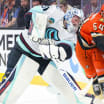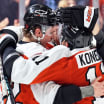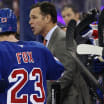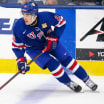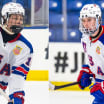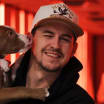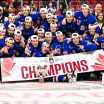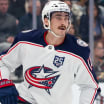Emergency goalie procedure doesn't need change, GMs say
Topic discussed at annual meetings after Ayres plays for Hurricanes
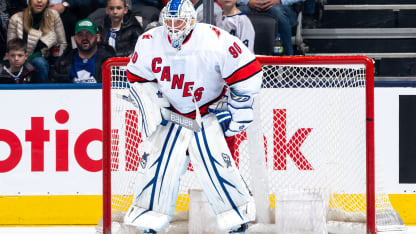
© Kevin Sousa/Getty Images
"There were a lot of discussions," NHL senior executive vice president of hockey operations Colin Campbell said. "Most important from it is, where we're at, I think it worked. Everyone is happy with where we're at on it. The process works."
The procedure came into the spotlight when
David Ayres played for the Carolina Hurricanes
during a 6-3 win against the Toronto Maple Leafs at Scotiabank Arena on Feb. 22 because of in-game injuries to Carolina goalies Petr Mrazek and James Reimer.
Ayres, a 42-year-old former ice resurfacing machine driver who is manager of operations at Mattamy Athletic Centre, the former Maple Leaf Gardens, and regularly practices with the Maple Leafs, played the final 29 minutes of the game, made eight saves, and became the oldest goalie in NHL history to win his regular-season debut.
Campbell said Hurricanes general manager Don Waddell and Maple Leafs GM Kyle Dubas were in the breakout group that discussed the EBUG procedure.
"It turned into a good human-interest story," Campbell said of Ayres.
But it also was just the second time that the EBUG played in more than 6,200 games played under the current procedure, which dates to the 2015-16 season and mandates there be one emergency backup with no prior professional playing experience in every arena for every game.
It also happened March 29, 2018, when
Scott Foster, a 36-year-old accountant, made seven saves in 14:01 of ice time
for the Chicago Blackhawks in a 6-2 win against the Winnipeg Jets at United Center.
"It's happened twice, but it doesn't mean something isn't running in the background," said Kay Whitmore, the NHL vice president of hockey operations. "Central Registry has this list and every night as soon as a goalie goes down, whichever one of our guys is in the Situation Room, we can call Central Registry, say so-and-so left the game, they give us a name that this guy is preapproved."
Ayres is one of 136 preapproved emergency backup goalies in the NHL this season.
Each season, every team is required to submit a list to the League of its eligible emergency backup goalies, who typically are former college or junior hockey goalies who live in the area.
The EBUG is eligible to play for either team, which is how Ayres, an emergency backup in Toronto, ended up playing for the Hurricanes.
"When one team's goalie gets hurt, you can't bring him out to sit on their bench in case the other team has both goalies go down, because then they're going to need him," Whitmore said.
If called into duty, the EBUG signs an amateur tryout contract (ATO) prior to going on the ice. He is not paid or considered a professional since he does not sign a professional contract.
"Every team now has got people that are available to perform and do well," Florida Panthers GM Dale Tallon said.
Some teams hold tryouts prior to the season to determine who is best suited to be on their list of emergency backups. The Los Angeles Kings did this with goaltending coach Bill Ranford present at the tryout to help with the vetting process.
"It becomes a pretty good in-community event," Whitmore said. "It depends where you sit geographically, the options are more limited in certain markets than others."
The EBUG also typically practices as a fill-in goalie for his home team when they want to rest one of their regular goalies, as Ayres does with the Maple Leafs. The EBUG also occasionally is asked to fill in for the goalie of a visiting team that might be practicing in his home market.
"There's stuff like that that does go on, and a lot of these guys probably see more NHL shots than what you would think they do," Winnipeg Jets GM Kevin Cheveldayoff said. "I know in Winnipeg we will bring a guy in every so often just to let the one goalie or another, if he's sick or if he's tired, to give him that break."
It's partly because of the experience that the EBUG generally has facing NHL shots that the GMs felt no change to the procedure was needed at this time.
"These guys are practiced goalies," Whitmore said. "They see NHL shots. Just because I played [in the NHL] 18 years ago doesn't mean I would be as good as [Ayres]. So don't judge him when he comes in; he actually knows what he's doing. That's why the managers said it's working the way it is for now. It was a good discussion, but leave it alone."

